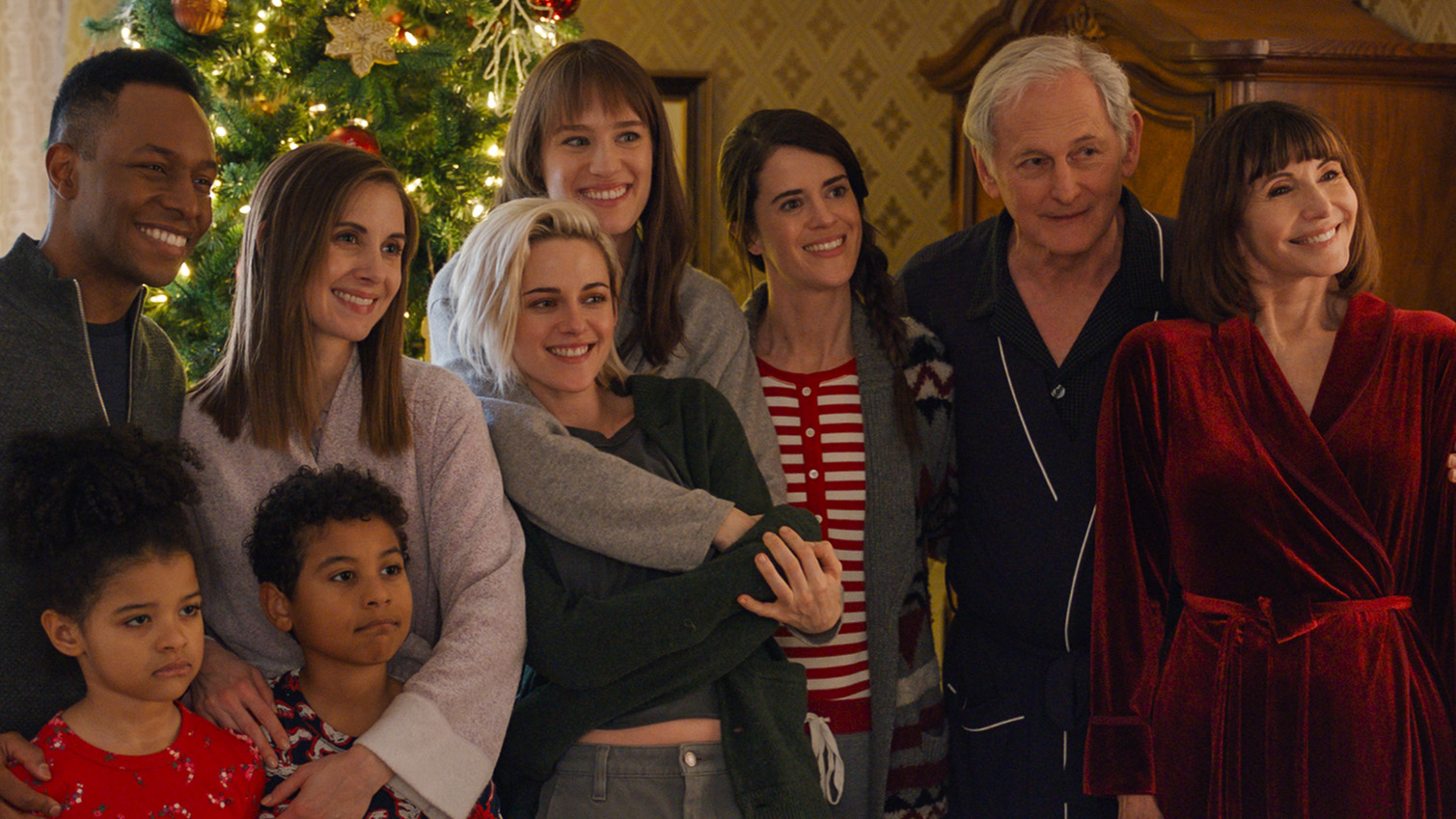Happiest Season, Hollywood’s first major lesbian Christmas rom-com, has everything you’d expect from a Christmas movie: snow; sweaters; mismatched family members coming together under one roof; characters saying they hate Christmas and then succumbing to holiday cheer; conflict; satisfying resolution. Director and co-writer Clea DuVall embraces cliches, but filtering them through a lesbian perspective allows old tropes to gain new context. Family dysfunction carries extra weight when viewed through the lens of heteronormativity. The happy couple’s falling-out hits deeper because it’s wrought with the anxiety of coming out. Their fairytale ending feels all the more precious because it’s hard won, and something we rarely see.
That couple comprises two of Hollywood’s most beloved young stars—Kristen Stewart and Mackenzie Davis—whose first scene instantly assures us of their warm, sparky chemistry. Harper (Davis) is the upbeat Christmas-lover and Abby (Stewart) isn’t a fan of the season, but she’s agreed to tag along with Harper on a guided Christmas walking tour because she knows it will make her girlfriend happy. If the dialogue might make you roll your eyes—Harper not-so-elegantly exposits that Abby doesn’t like Christmas because it’s when her parents died—it’s hard not to be charmed by Stewart and Davis’ antics. Drunkenly, at night and in a love-struck haze, Harper invites Abby to stay with her parents at Christmas, but doesn’t admit that she hasn’t come out to them yet. We have ourselves a rom-com premise.
Abby is stuck in the awkward situation of having to pretend to be her girlfriend’s :roommate”—thus her loneliness and ostracisation becomes DuVall’s central focus in a film where Abby is very much the main character. Harper’s mother (Mary Steenburgen), conservative politician father (Victor Garber), and her two sisters, Jane (Mary Holland, who also co-wrote the film) and Sloane (Alison Brie), are polite but patronizing to Abby, treating her like an outsider who they’re only accommodating as an act of charity. Stewart is perfect in the role: her well-known detailed, nervous tics convey Abby’s anxiety. She never seems to know what to say around Harper’s family, always making herself seem physically smaller; DuVall places other actors before Abby in the frame to ensure she keeps getting lost in the background. Stewart is rarely given a chance to flaunt her comic timing on screen, but Happiest Season proves it’s impeccable—she mines so much physical comedic gold out of Abby’s discomfort.
But we’re laughing with Abby, not at her, and we feel for her too—although I wish DuVall had committed a bit more to exploring her melancholy. In an unfamiliar place, surrounded by strangers, and with Harper frequently, insensitively abandoning her in favor of other family and friends, Abby feels totally isolated. The choice to focus on Abby as the main character pays dividends: Stewart really makes us feel Abby’s sense of betrayal by Harper, so the film’s conflict feels real, painful, and never contrived. But there are moments when DuVall could have lingered longer on shots of Abby by herself, to sit with her aloneness. She seems intent on cutting away to maintain buoyant pace rather than giving characters room to breathe.
Abby’s friendships with John (Dan Levy) and Riley (Aubrey Plaza) offer reprieve from Abby’s loneliness, drawing out the touching theme of queer solidarity and how it keeps Abby going. Levy is wonderful as Abby’s best friend who’s there on the phone whenever things get too much. While their banter brings a lightness to the film, you feel the depth and longevity of their relationship in the care and concern in John’s voice, or the way he comforts Abby with a reassuring hug or shoulder squeeze. Plaza’s Riley is Harper’s ex-girlfriend from high school, now out and proud, who offers a sympathetic ear to Abby. Riley could have just felt like a plot device—a romantic prospect to tempt Abby away from Harper—but her presence comes as a welcome relief. In Abby’s lowest moment, when it feels like her identity is being shunned by everyone, including her girlfriend, the solidarity she and Riley share as two lesbians in a sea of unwelcoming straight people runs deeper than mere seduction.
One of the smartest things about DuVall’s and Holland’s screenplay is that, while Harper’s parents’ casual homophobia makes it scary for her to come out, that’s only one part of a larger problem. Her parents are committed to maintaining an image of suburban perfection and upholding heteronormative gender roles in order to appeal to the conservative vote for election. It’s corrosive for all three of their children: Jane overcompensates massively in her bid to be the favorite child; Sloane is uptight and stern because she feels like her parents only see her failures, none of her many achievements; and both Sloane and Harper have secrets that are eating them up inside. These tensions boil until they bubble over in the film’s final act, when Harper realizes that addressing the homophobia in her family means tackling a whole host of other issues. Sadly, the film somewhat glosses over that healing process in its rush toward a happy ending.
In all honesty, though, that happy ending earns a grin despite its corniness. Happiest Season has been a much-anticipated shining light for many movie lovers, a promise of a little cinematic joy at the end of a relentlessly tough year. Great rom-coms can circumvent flaws if they deliver on the joy, the cosiness, and the chemistry, and DuVall’s film offers a generous helping of all three. I’m sure that many of us will return to it, like comfort food, throughout the holiday season.
Happiest Season comes to Hulu on November 25.

